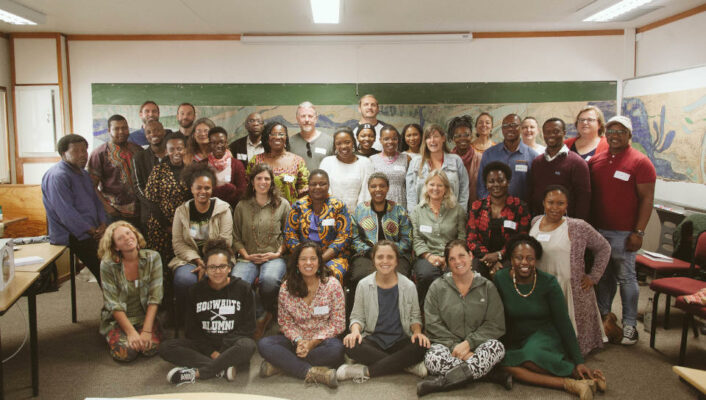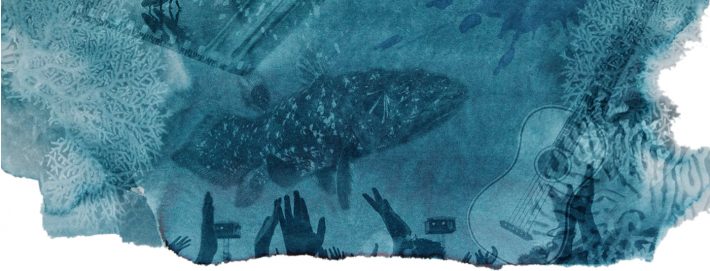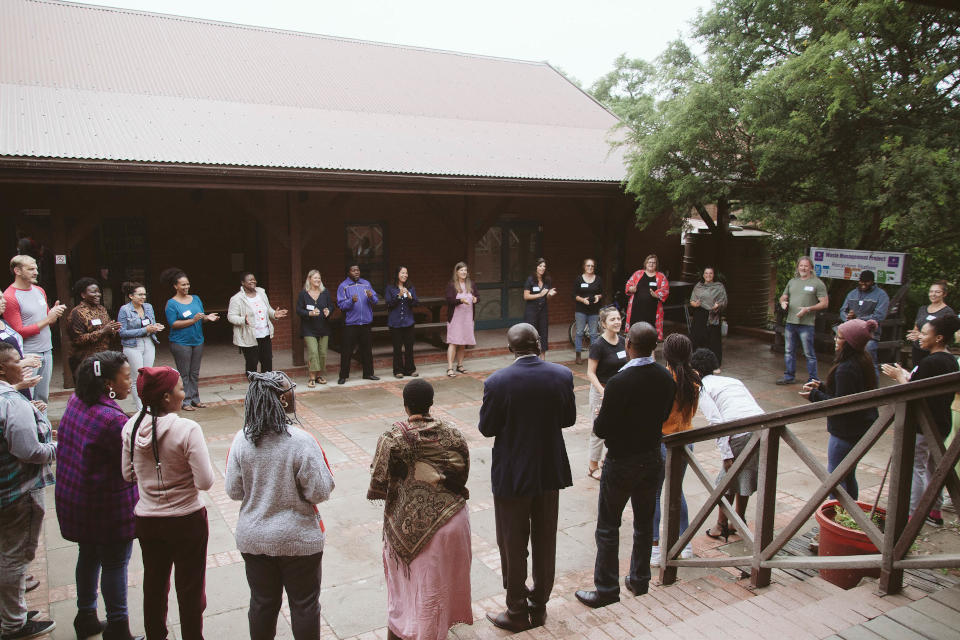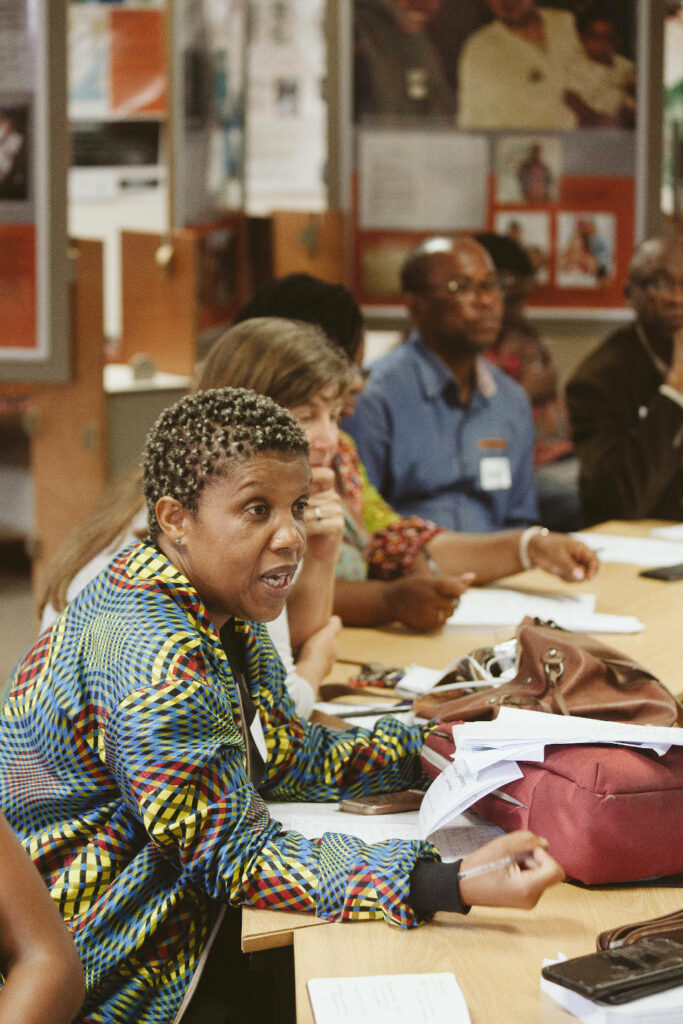Reflections on engaged, transdisciplinary creative research practice


The Lalela uLwandle play focuses on three stories from characters with historically, culturally, spiritually varied locations, all in close relationship to the ocean. The play coincided with a civil society campaign to oppose an application for off-shore drilling and the audience dialogue served to surface matters of public concern that could be included in the objection to this ocean development (read more on this here).
After a 6-month tour and 14 performances of the Lalela Ulwandle play (discussed in a previous blog post), researchers, artists, civil society members, small scale fishers, students and lecturers from different areas of work and institutions got together to reflect on what had been learned as well as think more broadly about the role of creative practice in transdisciplinary research. While the majority were South African, there were participants from Ghana, Namibia, Scotland and Kenya that gathered from 9-13 March 2020, with a view to bringing together a community of transdisciplinary practitioners.
The first day of the workshop focused on the history of Empatheatre and the participants witnessed empatheatre in action: the Lalela uLwandle play and the post-performance discussion. During the second day, scholars and practitioners were invited to share examples of creative practice and partnership building in work aspiring towards engaged research. We heard stories of theatre for dialogue about local water issues, theatre for dialogue about environmental education, place-based photovoice methods, an arts-based collaboration in a mixed-income housing development. These presentations were followed by for group discussions and plenary dialogue.
Those working on social and environmental challenges around the world are using and exploring the arts for making knowledge production and decision making better attuned to the needs of the most marginalised, particularly to address the way well intended solutions end up ignoring the knowledge held by those excluded. Creative practice brings opportunities to reframe concerns, to disseminate and mirror back ethnographic research, to disrupt and recreate narratives, deepen and depolarise contentious issues moving towards re-imagined alternatives. It also brings the possibility of a language that transcends speech and text, to accessing the affective/emotive dimensions of our concerns.
However, knowing that arts-based approaches cannot be considered ‘silver bullet’ solutions1, that creative practice is not automatically a practice that is in the interest of the common good and solidarity, much of the dialogue at the workshop honed in on the elements that need to accompany arts-based practice including:
- developing rigorous analysis of power with a sensitivity to history (as we illuminate the experiences of coastal communities how do we understand both the powers at play behind their challenges but also their own change making actions),
- working with multiple knowledges (ensuring that we embrace experiential, situated, political, social movement as well as scientific knowledge as we represent ocean challenges through art),
- being grounded in context (draw on the potential of arts-based process to show how abstract ideologies meet grounded context with results that are complex and unpredictable) and
- remaining open to the dialogue that a theatre/art piece inspires. In this assemblage of sensibilities, creative practice has significant transformative potential.
Below I share three critical reflections from this workshop (the full report can be read here): positioning one’s work as resistance for organised collective action; intentional logistics and a concern for language.
Positioning one’s work as resistance in a network of collective action:

Stories of experiences on the margins need to be extended to their potential to critique oppressive powers. A fisher in the audience posed the question in the discussion of the LU play, “who is the enemy here? We fishers know our stories, what we need you researchers to do, is to help us understand why the government is doing what it is doing” This comment posed a critical challenge identifying the need to understand the powers that were behind the struggles represented in the play. This speaks to a broader strategy in resistance work which is to work on identifying and understanding the system of structures that are causing oppression or marginalisation. Thus, through the work of understanding the daily struggles of people at the coal face of environmental justice, we need to find ways to extend those stories as critiques and demands, speaking to power for the desired change. For example, how might the story telling of fisher cultural histories open up further lock-ins experienced by policy makers, such as the backlash from commercial fisheries if the fishery allocations shift from commercial to small scale.
Given the differences in power and privilege inherent in university community relationships vital to this work is the need for critical self-reflection by those involved in the creative process. An aid to this was presented beautifully by Dr Michel Wahome in the form of a reinvented good Samaritan story. She asked, what if the bandit and the good Samaritan were working together and the bandit has “set the stage” for the good Samaritan to be good. This clever rendition of a familiar story, reminds us that we need to understand the ways in which the tendency to jump to proposed solutions without addressing root causes or listening to appropriate solutions in context, stand in the way of realising our “good intensions”. As we listen to and with people who grapple with the worst of our environmental and social challenges, it can be tempting to rush to solutions. As Dr Wahome argued, this can often contribute to the problem such as the assumptions that we hold the answer to a complex problem which renders those who have been resisting it as without agency or knowledge.
We developed the following set of questions from dialogue in the workshop. We found these questions to be vehicles to critical concerns for the practice of arts-based transdisciplinary research by researchers, artists, community leaders and practitioners. They will need to be re-visited across time and project type, however they provide a basis for critical refection:
- How am I representing the voice of others?
- Have I considered all the terms I am using in conversation with the participants?
- How am I situating my process in relation to myself, my participants, broader social structures and the planet, so that I do not abstract the process from the context in which it emerged?
- What does my relationship building process look like that led to the engagement?
- Have I reflected on my positioning in relation to antiblack racism within South African Society?
- Why is it important that I work with the subjects I am working with? What assumptions do I have about them? How are invisible assumptions I did not realise I had made visible for me in the context of this research practice? How am I continuously disrupted and reminded about my own learning journey?
- Have I done a significant analysis of the challenge to which my research responds and have I attempted to make contact with other researchers who are looking at different aspects, actors of the problem?
- Have I adequately considered what I am giving and what I am taking from this interaction with research partners/subjects? What is my impact and how am I impacted? Without over-burdening, the researcher with the weight of the world (after all, a researcher is just another job), have I adequately accounted for my privilege in these relationships, and therefore what I can reasonably offer of myself and my position to be in service to others’ projects or needs?
- Am I working hard enough at ensuring integrity in my relationship building, positionality statements, expressions of solidarity – and find ways of striving for sincerity over piety? This is rather than performing in a way that utters the correct words and does the correct actions without being attuned to the essence of the encounter2.
Intentional “logistics”
Benson et al. (2018)3 wrote about how setting up a decolonised and anti-racist community history education space required careful thought an attention to elements usually ring fenced and belittled as “logistics”. We had a similar experience in our workshop. We put a lot of thought into what it would be like for people to meet in a university space. We were interested to hear the positive feedback of a small-scale fisher who was so grateful to be present in the space where one day their children would register for tertiary education.
On the other hand, they had to travel a long way to attend the Lalela Ulwandle performance. Linked to this, we experienced a power cut in the middle of the performance, and due to the need to travel back home before dark, the fishers were then unable to watch the full performance. This experience reminded the organisers of how much intentional thought is required to realise the possibility for multiple groups of South African society to come together and engage in dialogue.
A concern for language

South Africa is a country with 11 official languages. Despite this being the case for over 20 years, we still find policy processes that fail to make policy available in multiple languages. The theme of language showed up in a number of ways in this workshop.
- A young scholar reflected upon how doing a collage allowed her to articulate some thoughts and feelings she has been having about her research that she was not able to articulate freely: “I always have this clear picture in my mind that I want to put in words but always leave feeling I didn’t communicate what I wanted to. It has never dawned on me that maybe the picture in mind and words in mind can be best said in a big picture with pictures of things, people and words. During the collage making I could find words and pictures that said what I was brave and not so brave to say”. This was a moment when the power of non-verbal language was accessed for sense-making. Likewise, the violence of Mpume stomping on the little huts in the play did not have to be described, it could be felt in her actions. [insert image].
- Through translating the word “participation” during introductions, we found we had at least 14 different languages in the room. Beyond highlighting their presence in the room, we were not equipped to bring these multiple languages more predominantly into the discussions. However, language was referred back to throughout the workshop as an important concern for participatory work.
- There was a tension with language used to signify race and class: on the one hand, terms such as “poor”, “black”, “white”, “the community” pose the danger of essentialising and grouping a significantly diverse set of experiences into one; on the other hand, as Kendi4 writes, we need to have ways to identify racist policies and realities and “terminating racial categories is potentially the last, not the first step in anti-racist struggle. Moving in the uneasiness between these two tensions requires qualifications and careful analysis with terms. We also agreed that realising change is in part made possible through reinventing language. So that is the effect of our naming/language practices.
Closing
The opportunity to reflect on Lalela Ulwandle allowed for a productive exploration into multiple dynamics and tensions involved in engaged research praxis that employs creative methods towards the goals of dialogue and transdisciplinary work. This workshop constituted a theory in practice of transdisciplinary creative practice for research and action that moves in a way that reflects the world it wants to bring about.
References
- Gaztambide-Fernández, R. A. (2013). Why the arts don’t do anything: Toward a New Vision for Cultural production in education. Harvard Educational Review, 83(1), 211–237.
- MacFarlane, 2019, Faking close-up research?: the risks of strategic deception in a post truth world. Paper presented at HECU2020/ “critical approaches to close-up higher education research.
- Benson, K., Gamedze, A., & Koranteng, A. (2018). African History in Context: Towards a Praxis of Radical Education. In C. Aziz & S. Vally (Eds.), Reflections on knowledge, learning and social movements: History’s schools (pp. 104–116). New York: Routledge.
- Kendi, I. X, 2019. How to be an antiracist. Penguin Random House LLC. https://g.co/kgs/W8YPQU